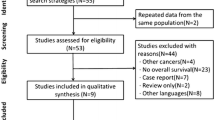Abstract
Background
Surgical outcomes of multiorgan resection (MOR) for T4 gastric carcinoma reported in the literature are widely variable. We herein report a large surgical series of T4 gastric carcinoma.
Methods
One hundred seventy-nine patients with cT4 gastric carcinoma were recruited onto the study. Patient characteristics, surgical strategy and related complications, long-term survival, and prognostic factors of T4 gastric carcinoma were analyzed.
Results
Of 179 cT4 gastric carcinoma, there were 57 cT4 (pT3) with MOR, 91 pT4 with MOR, and 31 cT4 without MOR. pT4 with MOR were more likely to be associated with nodal metastasis, cellular dedifferentiation, and lymphoperineural infiltration compared to those of pT0–3 (P < 0.01 for all). For 91 pT4 with MOR, their surgical mortality and morbidity rates were 4.4 and 28.6%, respectively; their 1-, 3-, and 5-year overall survival rates were 55.2, 22.4, and 12.2%, respectively. The long-term survival of cT4 (pT3) with MOR was superior to pT4 with MOR (P = 0.006) and cT4 without MOR (P = 0.004). There was a striking difference between pT4 with MOR, R0 and pT4 with MOR, and R1 or R2 (P = 0.007). By means of multivariate analysis, lymph node status, liver invasion, and positive surgical margin were independent prognostic factors.
Conclusions
Aggressive surgical management of pT4 gastric carcinoma should be limited to patients without adverse prognostic factors such as advanced nodal involvement and pancreatic invasion.

Similar content being viewed by others
References
Jemal A, Siegel R, Ward E, et al. Cancer statistics, 2006. CA Cancer J Clin. 2006;56:106–30.
Annual report of cancer registration, 2006. Department of Health, Executive Yuan, Republic of China. http://www.doh.gov.tw.
Martin RC II, Jaques DP, Brennan MF, et al. Achieving R0 resection for locally advanced gastric cancer: is it worth the risk of multiorgan resection? J Am Coll Surg. 2002;194:568–77.
Nanthakumaran S, Fernandes E, Thompson AM, et al. Morbidity and mortality rates following gastric cancer surgery and contiguous organ removal, a population based study. Eur J Surg Oncol. 2005;31:1141–4.
Oñate-Ocaña LF, Becker M, Carrillo JF, et al. Selection of best candidates for multiorgan resection among patients with T4 gastric carcinoma. J Surg Oncol. 2008;98:336–42.
Ozer I, Bostanci EB, Orug T, et al. Surgical outcomes and survival after multiorgan resection for locally advanced gastric cancer. Am J Surg. 2009;198:25–30.
Jeong O, Choi WY, Park YK. Appropriate selection of patients for combined organ resection in cases of gastric carcinoma invading adjacent organs. J Surg Oncol. 2009;100:115–20.
Saito H, Tsujitani S, Maeda Y, et al. Combined resection of invaded organs in patients with T4 gastric carcinoma. Gastric Cancer. 2001;4:206–11.
Kunisaki C, Akiyama H, Nomura M, et al. Surgical outcomes in patients with T4 gastric carcinoma. J Am Coll Surg. 2006;202:223–30.
Carboni F, Lepiane P, Santoro R, et al. Extended multiorgan resection for T4 gastric carcinoma: 25-year experience. J Surg Oncol. 2005;90:95–100.
Dhar DK, Kubota H, Tachibana M, et al. Prognosis of T4 gastric carcinoma patients: an appraisal of aggressive surgical treatment. J Surg Oncol. 2001;76:278–82.
Kobayashi A, Nakagohri T, Konishi M, et al. Aggressive surgical treatment for T4 gastric cancer. J Gastrointest Surg. 2004;8:464–70.
Greence FL, Page DL, Fleming ID, et al. American Joint Committee on Cancer. AJCC cancer staging manual. 6th ed. New York: Springer, 2002.
Martin RC II, Jaques DP, Brennan MF, et al. Extended local resection for advanced gastric cancer: increased survival versus increased morbidity. Ann Surg. 2002;236:159–65.
Hartgrink HH, van de Velde CJ, Putter H, et al. Extended lymph node dissection for gastric cancer: who may benefit? Final results of the randomized Dutch Gastric Cancer Group trial. J Clin Oncol. 2004;22:2069–77.
Kwee RM, Kwee TC. Imaging in assessing lymph node status in gastric cancer. Gastric Cancer. 2009;12:6–22.
Chen CY, Hsu JS, Wu DC, et al. Gastric cancer: preoperative local staging with 3D multi-detector row CT—correlation with surgical and histopathological results. Radiology. 2007;242:472–82.
Macdonald JS, Smalley SR, Benedetti J, et al. Chemoradiotherapy after surgery compared with surgery alone for adenocarcinoma of the stomach or gastroesophageal junction. N Engl J Med. 2001;345:725–30.
Cunningham D, Allum WH, Stenning S, et al. Perioperative chemotherapy versus surgery alone for respectable gastroesophageal cancer. N Engl J Med. 2006;355:11–20.
Dikken JL, Jansen EPM, Cats A, et al. Impact of the extent of surgery and postoperative chemoradiotherapy on recurrence patterns in gastric cancer. J Clin Oncol. 2010;28:2430–6.
Siewert JR, Bottcher K, Stein HJ, et al. Relevant prognostic factors in gastric cancer: ten-year results of the German Gastric Cancer study. Ann Surg. 1998;228:449–61.
Acknowledgment
This work was partly supported by the Chang Gung Medical Research Program, Taiwan (CMRPG 380161), and the grants of Department of Health, Taiwan (DOH99-TD-C-111-006; PMRPG390071).
Conflict of interest
The authors declare no conflict of interest.
Author information
Authors and Affiliations
Corresponding authors
Additional information
The first two authors contributed equally to this work.
Rights and permissions
About this article
Cite this article
Cheng, CT., Tsai, CY., Hsu, JT. et al. Aggressive Surgical Approach for Patients with T4 Gastric Carcinoma: Promise or Myth?. Ann Surg Oncol 18, 1606–1614 (2011). https://doi.org/10.1245/s10434-010-1534-x
Received:
Published:
Issue Date:
DOI: https://doi.org/10.1245/s10434-010-1534-x




